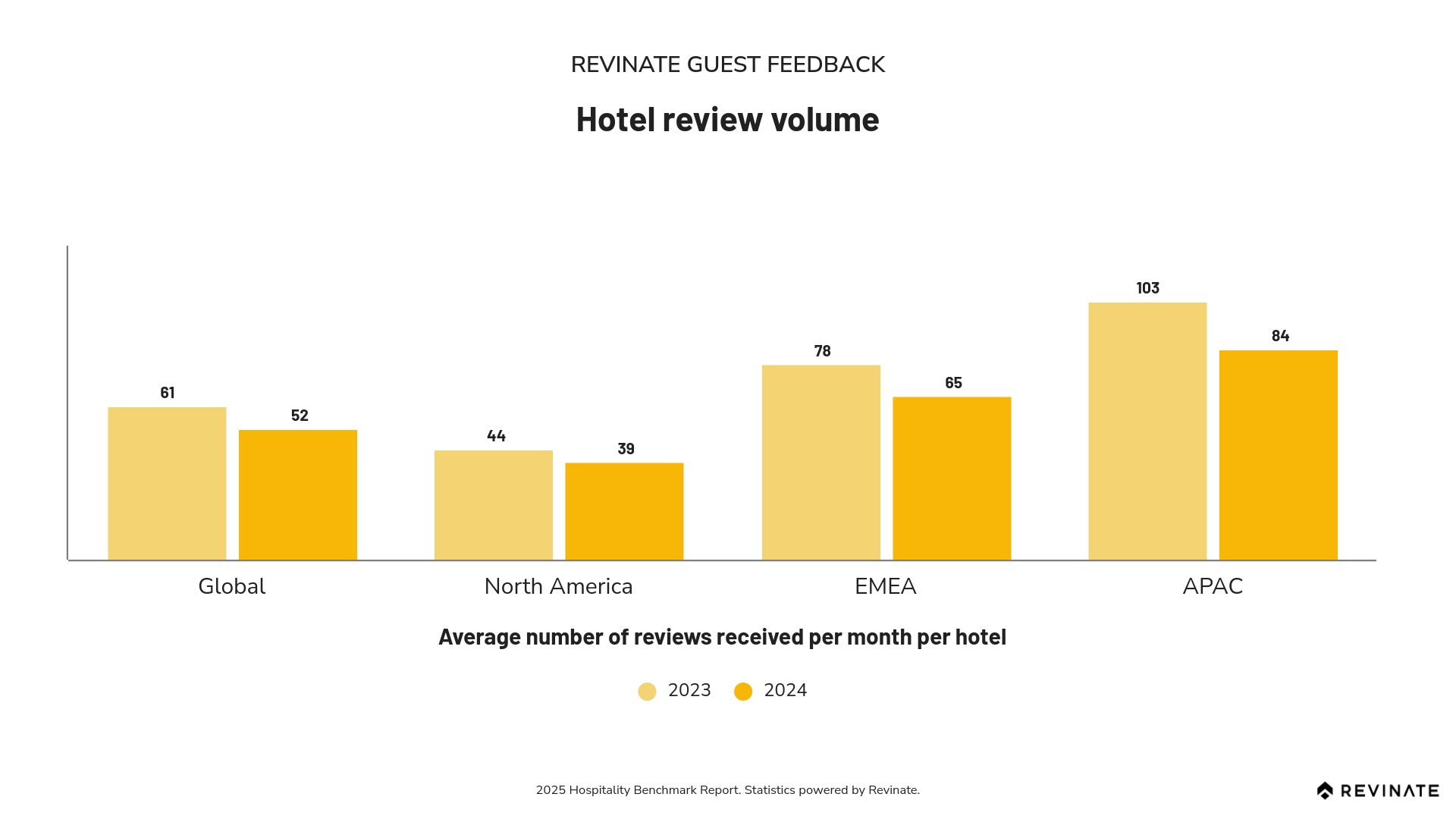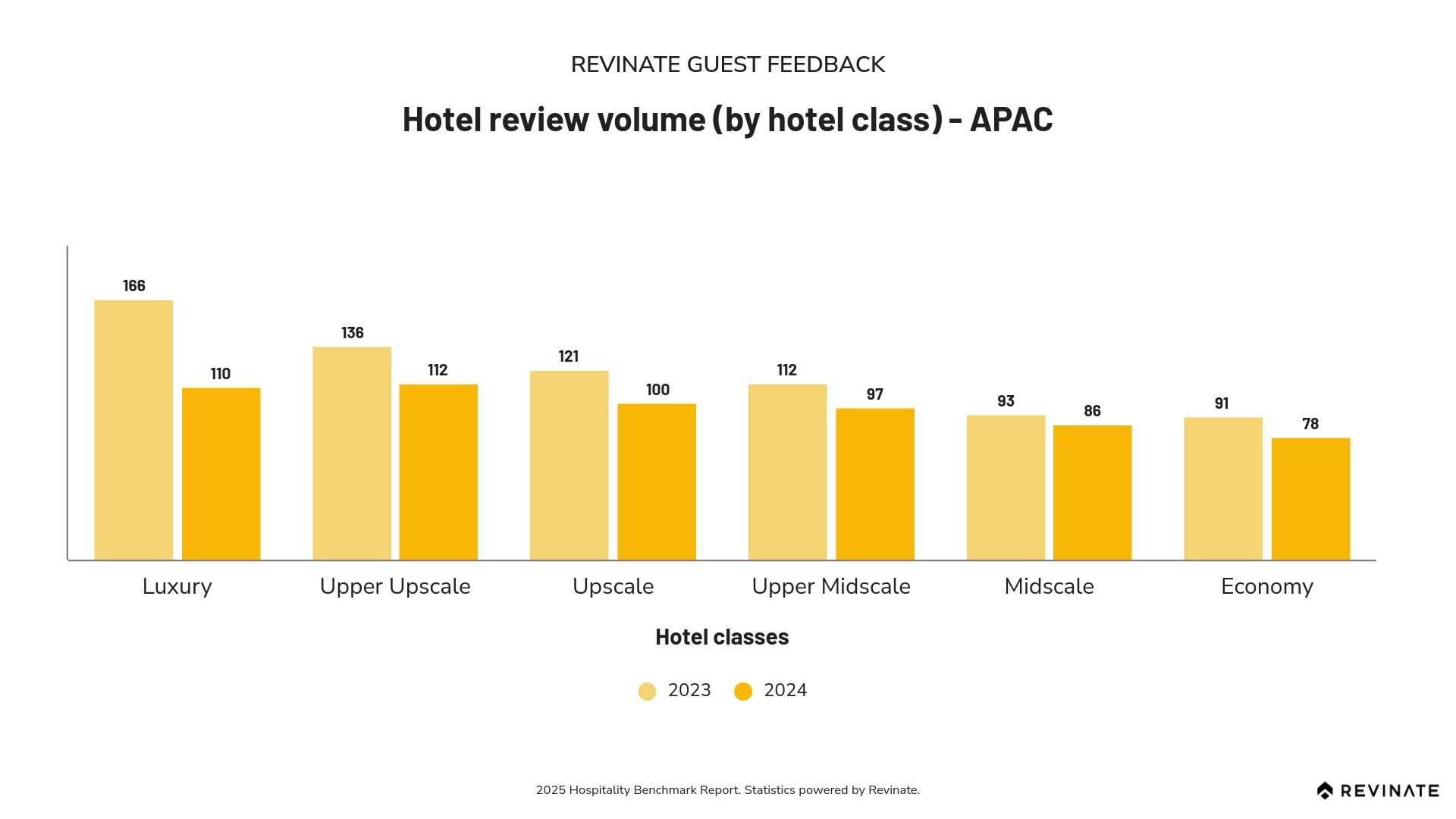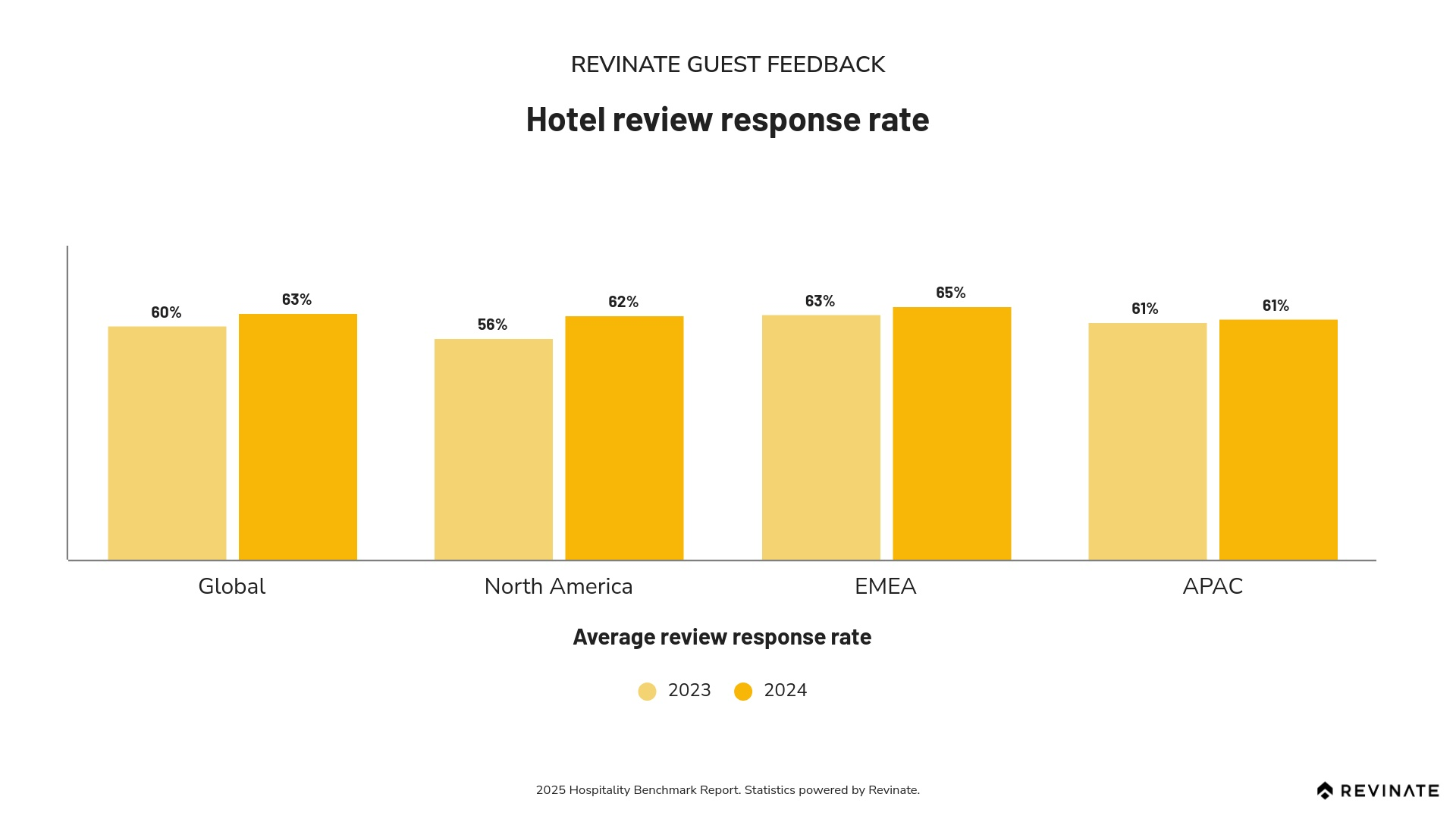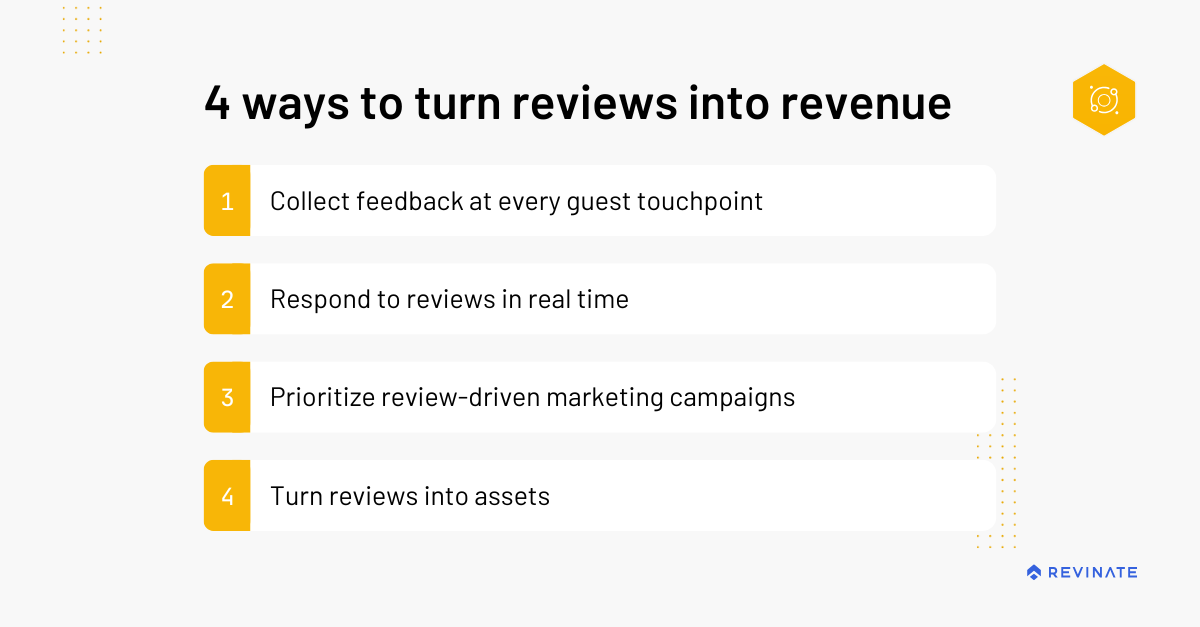Web capture & hotel reviews: What APAC hoteliers need to know
Web capture & hotel reviews: What APAC hoteliers need to know
In the competitive and digital-first region of APAC, hotel reviews hold more influence over booking decisions than ever before. No longer just considered to be social proof, your hotel reviews are now a key performance driver, placing more importance on your web capture (your ability to collect guest data from across the web) than ever before.
For APAC hoteliers, web capture is key for business growth in 2025. But new insights from our 2025 Hospitality Benchmark Report reveal a new concerning trend: APAC hotels are experiencing the largest drop in hotel review volume across the globe.
The impact? When you receive less hotel reviews, you’re losing opportunities to understand your guests’ experiences at your hotel, the ability to respond to guest sentiments in real time, and the chance to use this feedback to improve your hotel operations and marketing strategy.
But there’s a way to turn things around and get back on the right path in 2025 — through your web capture strategy.
What is web capture?
Essentially, as a hotelier, your web capture is your ability to effectively collect your guest data from across the web. In other words, it’s how you “capture” your hotel’s online reputation. And you can do this through multiple sources, including your hotel’s website, online travel agencies (OTAs) and other booking engines, review websites, and more.
The reason web capture is so important is that it enables you to determine how your guests perceive their experiences at your hotels and then act on this critical information to improve everything from your online reputation to the guest journey. And this, ultimately, results in fewer website abandonments and more direct bookings.
Why hotel reviews are an important performance indicator
It’s no secret that digital bookings still dominate in APAC. But did you know that hotel reviews are a critical factor in whether or not a potential guest completes their booking or simply abandons your website altogether?
The reality is that modern travelers rely on guest reviews to determine if they trust your brand and can expect to have a quality experience on your property. And when it comes to booking guests with higher expectations and shorter windows for decision making, your hotel reviews are fast and credible ways to validate that your property is the one to choose.
In addition to helping you secure more bookings, guest reviews also provide key insights into how your guests perceive your hotel. And this information is valuable for helping you to spot gaps or trends in your services and operations, which help you to identify opportunities to improve the guest experience.
This brings us to why your hotel reviews can be a key performance driver — but only if you’re using them effectively by prioritizing your web capture. The right web capture and hotel reputation management tools enable you to monitor and respond to any guest feedback in real time across multiple digital channels, allowing you to take a proactive vs. reactive approach to your hotel’s reputation.
Web capture in APAC: Insights from the 2025 report
According to the 2025 Hospitality Benchmark Report, APAC hotels experienced the largest decline in hotel review volume worldwide. While the average global review volume dropped by about 15%, APAC hotel reviews dropped by more than 18%.

Additionally, luxury hotels experienced the largest drop in reviews, averaging at a 34% decrease YoY.

And while the average review response rate grew slightly YoY for other regions throughout the world, APAC’s remained the same at 61%, revealing a major opportunity for hoteliers to improve their web capture and better manage their hotels’ reputations.

Want to learn even more about web capture trends in APAC? Check out the report for the full benchmark data for web capture in APAC.
How hotel reviews impact your revenue
It’s clear that the link between hotel reviews and revenue is growing stronger each year. Guests consistently have shown that they trust recent reviews and expect hotels to deliver quality service and respond thoughtfully to any and all feedback. And when these elements come together, people are more likely to book direct and become loyal guests.
So, what does this ultimately mean for APAC hoteliers?
- More reviews = more direct bookings. By increasing your recent reviews, you also increase the likelihood of having higher conversions by showing potential guests that your hotel is a reliable and trustworthy choice for their stay.
- Positive reviews = higher spend. When a guest trusts your level of service and the quality of your property, they’re more likely to book longer stays and even take advantage of other offerings, leading to increased ancillary revenue for your hotel.
- Negative reviews = opportunity for improvement. No one wants to get a negative review. But because they’re inevitable, it’s best to have a response plan in place. Responding to negative reviews publicly — and well— can actually boost your reputation by showing your ability to thoughtfully consider and address any concerns from previous guests.
Remember — you can’t fix what you don’t know, and you can’t improve what you don’t track. Utilizing the right web capture tools and strategy will help you to better manage your hotel’s reputation and positively impact your revenue.
4 ways to use hotel reviews and web capture to drive direct bookings
In order to improve your hotel reputation management, you have to start with collecting the right feedback and proceed by acting on it. Here are four key ways APAC hoteliers can do just that:
1. Collect feedback at every guest touchpoint.
From your website to your post-stay survey, prioritize capturing your guests’ sentiments at every touchpoint. You can use Revinate Guest Feedback to help gather and centralize insights from across 100+ sites through one product while also allowing you to customize your surveys for the right guest at the right time.
2. Respond to reviews in real time.
Keep in mind that providing timely responses to guest feedback for your hotel shows future guests that you truly care about their experience. Make sure you prioritize responding to more urgent reviews, and always respond to all negative feedback. With the right tools, you can even set up ticketing rules that ensure your staff is alerted when follow-up is needed and then track that ticket through completion and reporting.
3. Prioritize review-driven marketing campaigns.
If you want to be successful in 2025, consider that your hotel reviews are more than just feedback: Think of them as strategic insights for better segmentation opportunities. You can analyze the sentiment of your guests and act on it with Revinate Marketing by segmenting guests based on their perception of your hotel. This allows you to trigger customized email campaigns based on their experiences, which will allow you to implement everything from re-engagement offers to loyalty programs.
4. Turn reviews into assets.
Finally, don’t forget to use your best reviews to market your hotel. Positive hotel reviews from your guests are often the most persuasive marketing materials you can use. Displaying authentic and relatable quotes from satisfied guests in digital ads, throughout your website copy, and even in website pop-ups is a highly effective marketing strategy for your hotel.

Key Takeaways
- In APAC’s digital-first hospitality landscape, hotel reviews are directly influencing guests’ booking decisions more than ever before.
- In 2024, APAC hotels experienced the largest global decline in review volume, revealing that hoteliers in the region are missing out on valuable opportunities to better understand their guests’ experiences and improve their hotel’s performance.
- As a result, it’s critical for hoteliers to adopt a strong web capture strategy that enables them to closely monitor and quickly act on guest feedback to better manage both their online reputation and guest loyalty.
- Hoteliers can begin to use hotel reviews and web capture to drive more bookings by collecting guest feedback at key touchpoints, responding to reviews quickly, creating review-driven marketing campaigns, and turning reviews into assets such as quotes in ads or throughout website copy.
Related Posts
This site is protected by reCAPTCHA and the Google Privacy Policy and Terms of Service apply. View our Terms & Conditions here. *Required fields.



